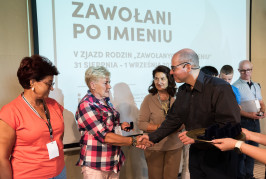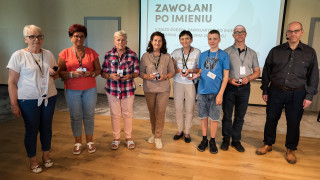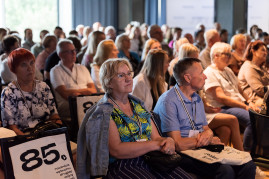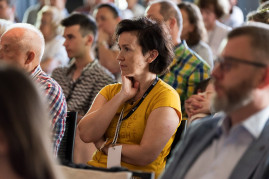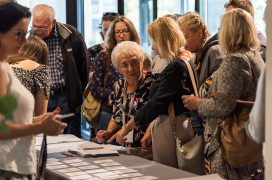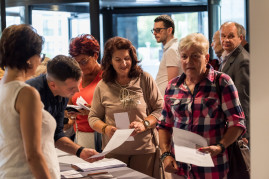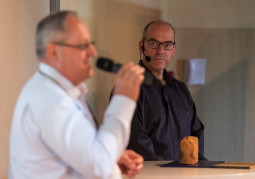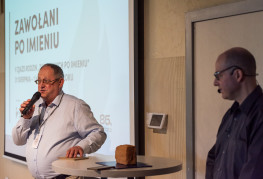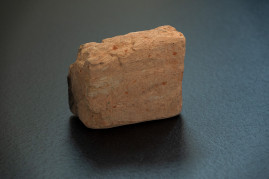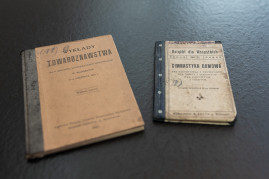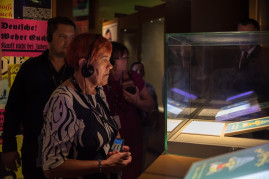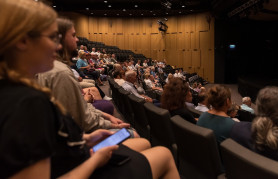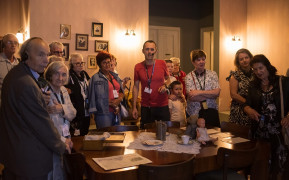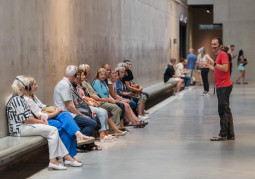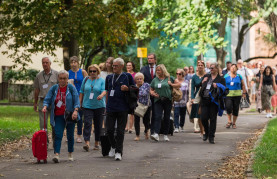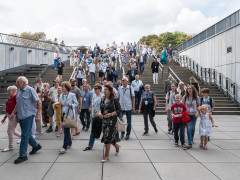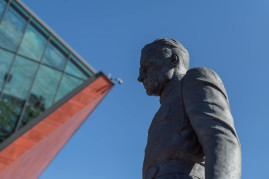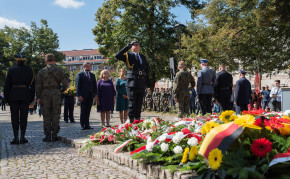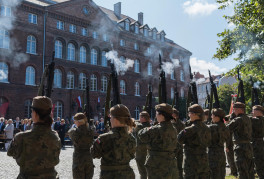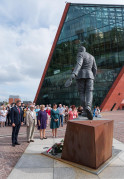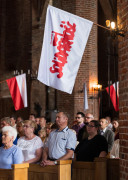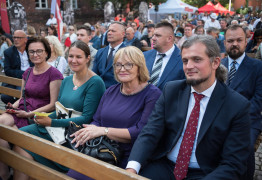5th Meeting of the “Called by Name” Families - Instytut Pileckiego
5th Meeting of the “Called by Name” Families
What are we looking for? Is there something we can give them and is there something in their legacy that we want to carry forward?
At the invitation of the Pilecki Institute, more than 130 relatives and descendants of Poles murdered for helping Jews during the German occupation met on 31 August 2024 in Gdańsk at the Meeting of Families involved in the “Called by Name” project.
The ceremonial opening of the 5th Meeting of Families was attended by, among others:
Dr. Wojciech Kozłowski, Acting Director of the Pilecki Institute; Dr. Jan Szkudliński, Head of the Scientific Department of the Second World War Museum in Gdańsk, Jerzy Ulma, nephew of Józef Ulma.
“We are part of a community whose strength lies in action: 37 commemoration ceremonies, 95 people Called by Name, in 36 towns across Poland. These numbers are just an illustration of a broader effort to anchor the Called by Name in the historical memory of Poles”, said Dr. Wojciech Kozłowski. “We succeeded in introducing the Called by Name into textbooks. Thus, they became part of the story of the Second World War, and this is our important contribution. Over the past five years, we have built a special scientific team, conducted educational and popularization activities, cooperated with local government authorities and cultural centers, and opened an exhibition in the center of Warsaw. We have invited international audiences, journalists, and Jewish circles to speak about your stories. The Called by Name were people who rescued Jews condemned to death, risking the loss of property and their own lives. They could have fallen victim to denunciation. To the Germans, they were “subhumans”, and murder without trial was common. An important element of our program is to grant justice to the Called by Name, through memorialization, recalling their names and symbolically revoking their death sentence. In this way, we perpetuate them in local and national memory. They lost their lives because the occupiers’ laws defined helping Jews as a crime, condemning good as evil. We do not consent to the totalitarian reversal of fundamental values.
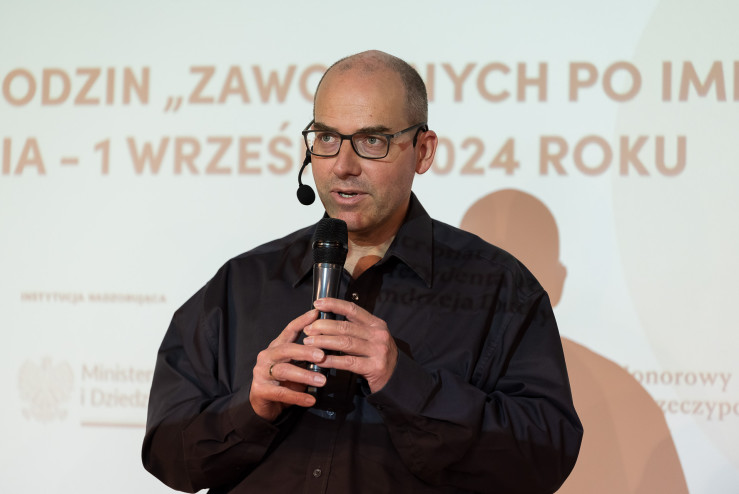
“With valor, the Called by Name showed solidarity with those facing persecution. Those who died often orphaned their families. The later fate of these families shows the far-reaching consequences of the aid that was offered. Subsequent generations have borne the consequences of German acts and occupation policies of terror. The Called by Name are first and foremost your loved ones; they are part of your history and your memory, and you also have a responsibility”, said the director during the meeting.
“The Called by Name are a beautiful part of the truth about the terrible times of the occupation. They are an inspiration to do good and stand valiantly by universal human values. They give us a sense of pride, and show that every person has a choice and freedom in their decisions. We receive a lot from the Called by Name. What matters now is what we do. What are we looking for? Is there something we can give them and is there something in their legacy that we want to carry forward?” the director added.
New members of the “Called by Name” Families
The meeting also featured the official inclusion into the “Called by Name” Families of new members whose loved ones were memorialized in the past year. The relatives of Zofia and Aleksander Kur, commemorated on 21 September 2023 in Gamratka, Aniela Nizioł, commemorated on 3 December 2023 in Łańcut, and the family of Marianna and Stanisław Siniarski, commemorated on 10 March 2024 in Lutkówka, all received commemorative pins with a symbolic flame that is the emblem of the “Called by Name” program (the flame symbolizes not only remembrance, but also hope for the program’s continuation).
Krystyna Malinowska, representative of the “Called by Name” Families, could not hide her emotion or gratitude to the staff of the Pilecki Institute. “Thank you for the enormous amount of work. Our parents did not pass everything on to us. The Called by Name team at the Pilecki Institute allows us, the families, to discover and fill in the gaps in our knowledge and memory. Thanks to which these stories can survive and be passed on,” she said.
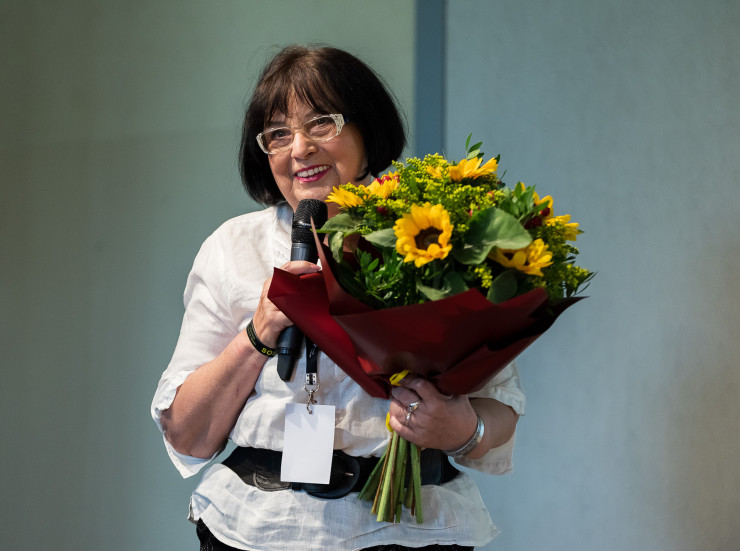
The meeting was also attended by representatives of the Ulma Family, who presented Dr. Wojciech Kozłowski, Acting Director of the Pilecki Institute, with artifacts from the Ulma family home.
Jerzy Ulma (nephew of Józef Ulma, who was murdered along with his wife and children by the Germans on 24 March 1944 in Markowa for hiding Jews), who was present at the meeting, donated two booklets over 100 years old from Józef Ulma’s private collection and a fragment of a brick from the house in Markowa where Józef Ulma was born.
While handing over the memorabilia, Jerzy Ulma noted that his uncle Józef had kept a rich library, the collection of which he made available to the residents of Markowa. His home was a place open to all who wanted to explore it.
The donated books:
Gimnastyka domowa, Bez nauczyciela i przyrządów dla dzieci i dla dorosłych dla zdrowych i chorych [“Home Gymnastics Without Teacher or Equipment, for Children and Adults, for the Healthy and Sick”], 4th edition with 50 Figures, published by M. Arcta in Warsaw, 1916.
Wykłady Towarzystwa na II Zjeździe Stowarzyszenia Spożywców w Warszawie [“Lectures of the Society at the Second Congress of the Society of Consumers in Warsaw”], 6 – 8 June 1910, 3rd edition, published by Polskie Stowarzyszenie Spożywców, Warsaw-Mokotów, Mickiewicza Street, 1920.
Previous Meetings of the Called by Name Families
The first Meeting of the Called by Name Families took place on 24 November 2019 in Brok on the Bug River, the second on 25 September 2021 in the Column Hall of the Polish Parliament, the third on 2–3 September 2022 in Folwark Łochów situated in the heart of the Bug Landscape Park, the fourth on 1–3 September 2023 in Łańcut, Rzeszów and Markowa in the Subcarpathian region. With each Meeting, the families build stronger and stronger inter-community and inter-generational ties, raising a new generation of custodians of memory.
